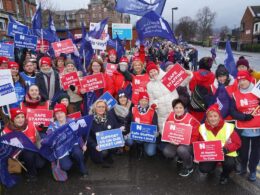The Historical Enquiries Team (HET) has been exposed as biased in its “investigation” of crimes carried out by the British Army, RUC and UDR over the course of the Troubles. Two reports have revealed that a softly-softly approach has been taken when questioning soldiers and police officers.
This should come as no surprise to anyone. The HET is an arm of the state and effectively operates under the control of the PSNI. Such a body will only go so far. The British government is always careful to protect its own interests and admitting its true role and murderous actions over the last forty years would undermine those interests.
The British government wishes to be seen as a neutral arbiter and buffer between two warring communities. The truth is that the ruling class, acting through the government and various organisations of the state, will take whatever measures it deems necessary to protect its privileges. Over the course of the Troubles it was determined to maintain stability for its own economic and political interests. This does not mean that it was (or is) opposed to the removal of the border in principle. Rather it calculated that any moves in this direction would result in greater conflict which would harm its interests. Thus, in order to maintain stability, it directed sharp repression against Catholic communities and tried to lean on the support of Protestant communities. When necessary of course it was also prepared to use lethal force in Protestant areas.
In the future the state will apply whatever measures it deems necessary when faced with united movements of the working class in Northern Ireland as well as movements of the working class and youth of England, Scotland and Wales. The workers’ movement has a duty to ensure that the state is exposed for its crimes over the course of the Troubles now, in order to better prepare for the struggles of the future.
It is also the duty of the workers movement to ensure justice for the families of the hundreds who died at the hands of the state. The quest for justice cannot be left in the hands of sectarian politicians, who to one extent or another, are also responsible for the death and suffering of the past 40 years. Today every sectarian party is loud in its calls for us all to “remember the past” but for each this call has a very different meaning. And for each it is a way of consolidating its position today.
The workers’ movement – the trade unions, genuine anti-sectarian political groups such as the Socialist Party, and genuine grassroots community and campaigning groups – must expose the anti-democratic actions of the state. The workers’ movement should also expose the crimes of sectarian parties (or their predecessors) that played entirely negative roles in the slide to the Troubles in the late 1960’s and early 1970’s and ever since. These parties have much to hide from the past and nothing to offer in the future.
The HET should be replaced by a full independent enquiry. Only the workers’ movement, which represented the majority of working class people at every stage of the Troubles in opposition to violence and in favour of a better life for all, can provide the independent and anti-sectarian voices needed to see the past clearly. And only the workers movement, through the unions and community and campaigning groups, and through a mass working class party which unites Protestant and Catholic in the future, can guarantee no return to the past.










